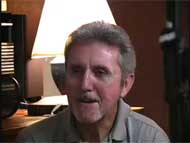
My name is Jim Conley. I was seventeen years old when I first went into service. I actually joined twice. The first time I joined was in ‘64 when I went into the army reserves. I got out in ‘65. I did my basic train, or NIT training, and then I came home. After coming back home, I worked several jobs, one of which was at the arsenal. I was then called back in 1968. Before I went into service the first time, I was in high school; the second time I was called back, I was working at the Radford Arsenal. I actually could have gotten out of going back the second time, but I was bored with life here. That’s why I volunteered to go back. I wasn’t that scared to go back because I knew it wasn’t a war like Vietnam or even WWII and it was a war that I supported at that time. I went to basic training at Fort Knox, where I made some friends, but we were never close. After basic training, it was several years before I went back to Korea in September 1968.
We flew to Korea in a plane full of soldiers, where we landed in Seoul at the Kabul Airbase. The one thing that really sticks out in my mind is the smell. They put us on a bus to take us up to the replacement company. On the way there, we had to drive through a fish market. That is the first time I had ever smelt anything like that. I thought that I wouldn’t survive because the smell was so raunchy. I felt like I was such a long way from home, but I really don’t get home sick that much.
I was in Krington to be a combat engineer, but when I got to Korea they put me in the infantry division. I was on the DMZ the whole time. There was a soldier from New Mexico, Sergeant Ramos. He and I were good friends, probably the closest. When we were there, we ate mostly sea rations. The DMZ had old farms that had been deserted about 12-15 years at that time.
There weren’t many things to do for fun in Korea, of course. But, we did have movies. I think through 68-69 I saw almost every movie that ever came out. Back then, going to the movies only cost 35 cents. And if we ever got the chance we would go to the clubs. These were military clubs and we would drink. That is pretty much what we would do.
But most of my time spent in Korea was not fun. We went into combat in Vietnam and part of my time was doing patrols on the DMZ. I can remember sweeping for mines and finding booby traps. In spite of these dangers, I was never wounded in the war. There were some other guys who got hurt; most of the injuries were caused by our own troops. One sergeant shot himself in the foot; there was another guy who had a grenade launcher go off and he shot another guy in the stomach.
Some of the scariest moments were at night. If the enemy were close to you, they would throw rocks to find where you were, to get you to fire. I had that happen to me, but I didn’t respond. If you did respond, the next thing that would come would be a grenade. That was a very frightening moment.
The communists that we fought were pretty dedicated. They would try to send people across, so we tried to keep them from coming down south and starting trouble. They were very tough, very well trained people. They were probably some of the best -trained soldiers over there.
The typical day in Korea depended on what your duty was. If you were on patrol, you stayed on patrol for 24-36 hours, and then you would come back and stay in company for about 20 hours. Then they’d put you right back in. If you were in a guard post, you would stay for 4 days, and they gave you a case of C rations to feed you for four days. Then you had to bury your fence, which was just south of the DMZ, and we had a chain link fence there. When you were there, you went out; when you were on night shift you went out before dark and stayed there till after daylight. This is what you would do everyday.
We lived in Quonset huts, which were half round buildings, when we were in the compound. When you were out on patrol, you would just sleep on the ground. These buildings weren’t in really good condition; they had been there since the Korean War in the 50’s, and this was 1968. We had to put up with all kinds of weather; I’ve had to sleep on the ground when it was 32 degrees below zero. When it was this cold, they required you to wear boots that you put on over other boots, which we called Mickey Mouse boots. We had to sleep with a mask on our face, because your face would become frostbit. We usually slept in sleeping bags and you usually kept your rifle in your sleeping bag with you.
The mosquitoes there were bad, so we usually slept under mosquito nets in the summer time. I never saw any snakes, so that made me happy. The animal that actually sticks out the most in my mind is the deer. I killed plenty of small deer.
We only had one USO show and it was when Bob Hope came to Seoul. I didn’t go because I was on duty. The only time I got to go to Seoul was when I came in and then again when I went out. It was a big, modern city. It was a very nice place. The people there didn’t like us a whole lot; crime was very prevalent, especially against us.
There were some very dangerous situations, sometimes involving shootouts. We were there during the Quarvo incident, which was when about 15 North Koreans were captured. They kept them hostage for a while before releasing them. It was really tense situation.
There were some people back home that opposed the war, but I didn’t hold it against them, especially when I got over seas. It changed my attitude a whole lot. I wasn’t so much against it; I probably was before I went over. When I came back out of the army I probably thought the ones that went to Canada were the smart ones, the ones that didn’t fight. I’m not sure if there were really any soldiers who opposed the war. We just put in our time and then we came home. That’s all we wanted to do.
I was certainly glad to come back home. I came through Japan, then Fort Lewis. At Fort Lewis, I caught a plane, got military standby, and I came all the way back to Bristol at the Tri City Airport. I was engaged before I went to Korea, so my wife met me right there at the airport. I was so happy to be back with her at home. We started making plans for our wedding when I returned home. I got home on the 19th and I was married on the 11th of October. It took me a while to adjust to civilian life.
I think that the war was a great experience for me. I’m happy, because I think I grew up a lot during that period in my life. It helped me a lot through my life. I learned a lot of discipline, things I didn’t do before then. But, I don’t know that I would do that again. I volunteered on a whim; I wouldn’t volunteer again.
I’m not sure if we failed Korea as a nation. We never had a treaty there. We’ve had troops there since the 50’s; I don’t know when we’ll get all the troops out. I think we, as a nation, should learn lessons from Korea. To fight a war, you have to fight it to win and then get out. Have some time when you can come home and say it’s over.
I personally learned many things from the war. I learned that the Korean War people are good. They’re honest people; a lot of them are hard working. Many lessons can be learned from them. I know I learned a lot from my fellow soldiers and from my experience in the war.
Apple quicktime will be needed to view the videos of the veterans. It can be downloaded for the mac or
the pc here.
